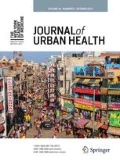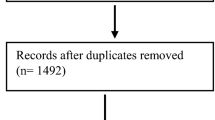Abstract
Access to energy is an important social determinant of health, and expanding the availability of affordable, clean energy is one of the Sustainable Development Goals. It has been argued that climate mitigation policies can, if well-designed in response to contextual factors, also achieve environmental, economic, and social progress, but otherwise pose risks to economic inequity generally and health inequity specifically. Decisions around such policies are hampered by data gaps, particularly in low- and middle-income countries (LMICs) and among vulnerable populations in high-income countries (HICs). The rise of “big data” offers the potential to address some of these gaps. This scoping review sought to explore the literature linking energy, big data, health, and decision-making.
Literature searches in PubMed, Embase, and Web of Science were conducted. English language articles up to April 1, 2020, were included. Pre-agreed study characteristics including geographic location, data collected, and study design were extracted and presented descriptively, and a qualitative thematic analysis was performed on the articles using NVivo.
Thirty-nine articles fulfilled eligibility criteria. These included a combination of review articles and research articles using primary or secondary data sources. The articles described health and economic effects of a wide range of energy types and uses, and attempted to model effects of a range of technological and policy innovations, in a variety of geographic contexts. Key themes identified in our analysis included the link between energy consumption and economic development, the role of inequality in understanding and predicting harms and benefits associated with energy production and use, the lack of available data on LMICs in general, and on the local contexts within them in particular. Examples of using “big data,” and areas in which the articles themselves described challenges with data limitations, were identified.
The findings of this scoping review demonstrate the challenges decision-makers face in achieving energy efficiency gains and reducing emissions, while avoiding the exacerbation of existing inequities. Understanding how to maximize gains in energy efficiency and uptake of new technologies requires a deeper understanding of how work and life is shaped by socioeconomic inequalities between and within countries. This is particularly the case for LMICs and in local contexts where few data are currently available, and for whom existing evidence may not be directly applicable. Big data approaches may offer some value in tracking the uptake of new approaches, provide greater data granularity, and help compensate for evidence gaps in low resource settings.

Similar content being viewed by others
References
Smith KR, Frumkin H, Balakrishnan K, Butler CD, Chafe ZA, Fairlie I, et al. Energy and human health. Annu Rev Public Health. 2013;34(1):159–88.
World Health Organization. Energy: shared interests in sustainable development and energy services. Geneva: World Health Organization;2013.
United Nations. Sustainable Development Goals overview. United Nations. https://unstats.un.org/sdgs/report/2019/overview/. Published 2020. Accessed 1/14/2021, 2020.
Diffenbaugh NS, Burke M. Global warming has increased global economic inequality. Proc Natl Acad Sci. 2019;116(20):9808–13.
Watts N, Amann M, Arnell N, Ayeb-Karlsson S, Beagley J, Belesova K, et al. The 2020 report of The <em>Lancet</em> Countdown on health and climate change: responding to converging crises. Lancet. 2021;397(10269):129–70.
Khan U, Zhang Y. The global inequalities and climate change. Environmental Science and Pollution Research. 2021.
Rao ND, Min J. Less global inequality can improve climate outcomes. WIREs Climate Change. 2018;9(2):e513.
Jessel S, Sawyer S, Hernández D. Energy, poverty, and health in climate change: a comprehensive review of an emerging literature. Front Public Health. 2019;7:357.
Markkanen S, Anger-Kraavi A. Social impacts of climate change mitigation policies and their implications for inequality. Clim Pol. 2019;19(7):827–44.
Galea S, Abdalla SM, Sturchio JL. Social determinants of health, data science, and decision-making: Forging a transdisciplinary synthesis. PLoS Med. 2020;17(6):e1003174.
Coar JT, Sewell JP. Zotero: harnessing the power of a personal bibliographic manager. Nurse Educ. 2010;35(5):205–7.
Ouzzani M, Hammady H, Fedorowicz Z, Elmagarmid A. Rayyan—a web and mobile app for systematic reviews. Systematic Reviews. 2016;5(1):210.
Arksey H, O'Malley L. Scoping studies: towards a methodological framework. International Journal of Research Methodology, Theory and Practice. 2005;8:19–32.
Levac D, Colquhoun H, O’Brien K. Scoping studies: advancing the methodology. Implement Sci. 2010;20:69.
Hsieh HF, Shannon SE. Three approaches to qualitative content analysis. Qual Health Res. 2005;15(9):1277–88.
Sofiev M, Winebrake JJ, Johansson L, Carr EW, Prank M, Soares J, et al. Cleaner fuels for ships provide public health benefits with climate tradeoffs. Nat Commun. 2018;9(1):406.
Winebrake JJ, Corbett JJ, Green EH, Lauer A, Eyring V. Mitigating the health impacts of pollution from oceangoing shipping: an assessment of low-sulfur fuel mandates. Environ Sci Technol. 2009;43(13):4776–82.
Scovronick N, França D, Alonso M, et al. Air quality and health impacts of future ethanol production and use in São Paulo State, Brazil. Int J Environ Res Public Health. 2016;13(7)
Spitzer HL. An analysis of the health benefits associated with the use of MTBE reformulated gasoline and oxygenated fuels in reducing atmospheric concentrations of selected volatile organic compounds. Risk Anal. 1997;17(6):683–91.
He L-Y, Yang S, Chang D. Oil price uncertainty, transport fuel demand and public health. Int J Environ Res Public Health. 2017;14(3):245.
Cai H, Xu M. Greenhouse gas implications of fleet electrification based on big data-informed individual travel patterns. Environ Sci Technol. 2013;47(16):9035–43.
Nanaki EA, Xydis GA, Koroneos CJ. Electric vehicle deployment in urban areas. Indoor and Built Environment. 2016;25(7):1065–74.
Chestnut LG, Mills DM. A fresh look at the benefits and costs of the US acid rain program. J Environ Manag. 2005;77(3):252–66.
Lin CK, Lin RT, Chen T, Zigler C, Wei Y, Christiani DC. A global perspective on coal-fired power plants and burden of lung cancer. Environ Health. 2019;18(1):9.
Chio CP, Lo WC, Tsuang BJ, Hu CC, Ku KC, Chen YJ, et al. Health impact assessment of PM(2.5) from a planned coal-fired power plant in Taiwan. J Formos Med Assoc. 2019;118(11):1494–503.
Bonjour S, Adair-Rohani H, Wolf J, Bruce NG, Mehta S, Prüss-Ustün A, et al. Solid fuel use for household cooking: country and regional estimates for 1980-2010. Environ Health Perspect. 2013;121(7):784–90.
Kyu HH, Georgiades K, Boyle MH. Biofuel smoke and child anemia in 29 developing countries: a multilevel analysis. Ann Epidemiol. 2010;20(11):811–7.
Wu W-T, Tsai P-J, Yang Y-H, Yang C-Y, Cheng K-F, Wu T-N. Health impacts associated with the implementation of a national petrol-lead phase-out program (PLPOP): evidence from Taiwan between 1981 and 2007. Sci Total Environ. 2011;409(5):863–7.
Markandya A, Armstrong BG, Hales S, Chiabai A, Criqui P, Mima S, et al. Public health benefits of strategies to reduce greenhouse-gas emissions: low-carbon electricity generation. Lancet. 2009;374(9706):2006–15.
Xiao F, Brajer V, Mead RW. Blowing in the wind: the impact of China’s Pearl River Delta on Hong Kong’s air quality. Sci Total Environ. 2006;367(1):96–111.
Aunan K, Pátzay G, Asbjørn Aaheim H, Martin SH. Health and environmental benefits from air pollution reductions in Hungary. Sci Total Environ. 1998;212(2-3):245–68.
Guo X, Zhao L, Chen D, Jia Y, Zhao N, Liu W, et al. Air quality improvement and health benefit of PM(2.5) reduction from the coal cap policy in the Beijing-Tianjin-Hebei (BTH) region, China. Environ Sci Pollut Res Int. 2018;25(32):32709–20.
Courtemanche C. A silver lining? The connection between gasoline prices and obesity. Econ Inq. 2011;49(3):935–57.
Liu M, Ren X, Cheng C, Wang Z. The role of globalization in CO2 emissions: a semi-parametric panel data analysis for G7. Sci Total Environ. 2020;718:137379.
Gohlke JM, Thomas R, Woodward A, Campbell-Lendrum D, Prüss-Üstün A, Hales S, et al. Estimating the global public health implications of electricity and coal consumption. Environ Health Perspect. 2011;119(6):821–6.
Torres-Duque C, Maldonado D, Pérez-Padilla R, Ezzati M, Viegi G. Biomass fuels and respiratory diseases: a review of the evidence. Proc Am Thorac Soc. 2008;5(5):577–90.
Marcus M. On the road to recovery: gasoline content regulations and child health. J Health Econ. 2017;54:98–123.
Kan H, Chen R, Tong S. Ambient air pollution, climate change, and population health in China. Environ Int. 2012;42:10–9.
Mbow C, Rosenzweig C, Barioni LG, Benton TG, Herrero M, Krishnapillai M, Liwenga E, Pradhan P, Rivera-Ferre MG, Sapkota T, Tubiello FN, Xu Y Food Security. In: Climate Change and Land: An IPCC special report on climate change, desertification, land degradation, sustainable land management, food security, and greenhouse gas fluxes in terrestrial ecosystems International Panel on Climate Change; 2019.
Li J, Guttikunda SK, Carmichael GR, Streets DG, Chang Y-S, Fung V. Quantifying the human health benefits of curbing air pollution in Shanghai. J Environ Manag. 2004;70(1):49–62.
Roth GA, Abate D, Abate KH, Abay SM, Abbafati C, Abbasi N, et al. Global, regional, and national age-sex-specific mortality for 282 causes of death in 195 countries and territories, 1980–2017: a systematic analysis for the Global Burden of Disease Study 2017. Lancet. 2018;392(10159):1736–88.
Davis DL. Short-term improvements in public health from global-climate policies on fossil-fuel combustion: an interim report. Lancet. 1997;350(9088):1341–9.
United Nations. Big data for sustainable development. United Nations. Global Issues Web site. https://www.un.org/en/global-issues/big-data-for-sustainable-development. Published 2021. Accessed 4/5/2021, 2021.
Snyder N. UN global working group on big data. Washington DC: United Nations Economic Commission for Europe; 2015.
DeSalvo K, Lurie N, Finne K, Worrall C, Bogdanov A, Dinkler A, et al. Using Medicare data to identify individuals who are electricity dependent to improve disaster preparedness and response. Am J Public Health. 2014;104(7):1160–4.
Abdolhosseini Qomi MJ, Noshadravan A, Sobstyl JM, et al. Data analytics for simplifying thermal efficiency planning in cities. J R Soc Interface. 2016;13(117)
Partridge I, Gamkhar S. A methodology for estimating health benefits of electricity generation using renewable technologies. Environ Int. 2012;39(1):103–10.
Penn SL, Arunachalam S, Woody M, Heiger-Bernays W, Tripodis Y, Levy JI. Estimating state-specific contributions to PM2.5- and O3-related health burden from residential combustion and electricity generating unit emissions in the United States. Environ Health Perspect. 2017;125(3):324–32.
Xing X, Wang J, Liu T, Liu H, Zhu Y. How energy consumption and pollutant emissions affect the disparity of public health in countries with high fossil energy consumption. Int J Environ Res Public Health. 2019;16(23):4678.
Dockery DW, Rich DQ, Goodman PG, et al. Effect of air pollution control on mortality and hospital admissions in Ireland. Res Rep Health Eff Inst. 2013;176:3–109.
Chen C, Chen B, Wang B, Huang C, Zhao J, Dai Y, et al. Low-carbon energy policy and ambient air pollution in Shanghai, China: a health-based economic assessment. Sci Total Environ. 2007;373(1):13–21.
Mestl HE, Aunan K, Seip HM. Health benefits from reducing indoor air pollution from household solid fuel use in China--three abatement scenarios. Environ Int. 2007;33(6):831–40.
Wang S-I, Lee L-T, Zou M-L, Fan C-W, Yaung C-L. Pregnancy outcome of women in the vicinity of nuclear power plants in Taiwan. Radiat Environ Biophys. 2010;49(1):57–65.
Author information
Authors and Affiliations
Corresponding author
Additional information
Publisher’s Note
Springer Nature remains neutral with regard to jurisdictional claims in published maps and institutional affiliations.
Supplementary Information
ESM 1
(DOCX 42 kb)
Rights and permissions
About this article
Cite this article
Maani, N., Robbins, G., Koya, S.F. et al. Energy, Data, and Decision-Making: a Scoping Review—the 3D Commission. J Urban Health 98 (Suppl 1), 79–88 (2021). https://doi.org/10.1007/s11524-021-00563-w
Accepted:
Published:
Issue Date:
DOI: https://doi.org/10.1007/s11524-021-00563-w




